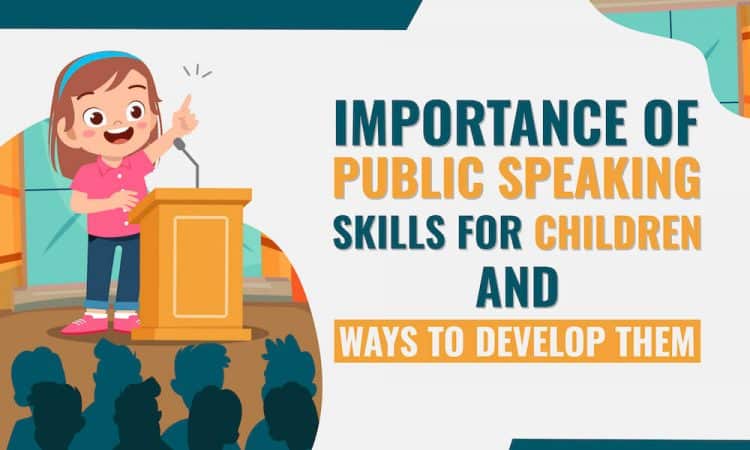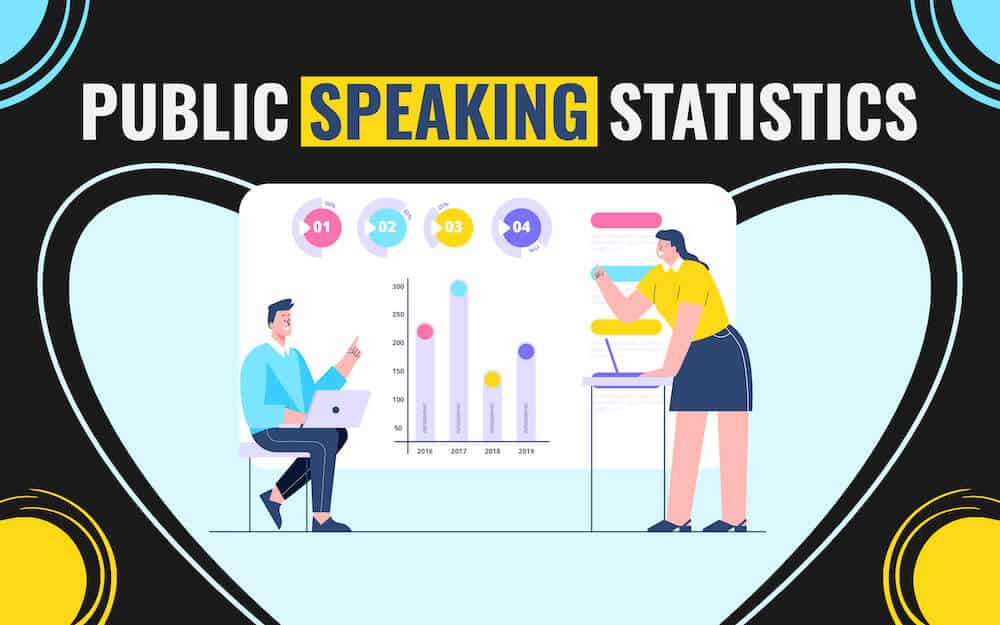
Let me take you through my school years. When I was in a playgroup, I was a timid child who did not have the courage to make new friends or communicate with others. However, as I hopped on to elementary school, I was constantly pushed by my teachers to participate in co-curricular such as extempores, speeches, assemblies, etc.
Even though getting on to the stage initially felt like a nightmare and gave me cold feet, eventually, I picked the pace and gained immense confidence. Over the years, I became one of the best public speakers in my school and brought laurels to them.
As I look back, had I not been pushed to participate, I wouldn’t be here writing this article. Public speaking not only gave me the confidence to face people but also taught me how to communicate effectively, listen proactively, be mindful of my posture and body language, and respect others’ opinions and values.
These skills have contributed immensely to my academic as well as professional life. In this article, we have covered the importance of public speaking for children and several ways in which you can help them develop and polish these skills.
Let’s get started!
Importance of Public Speaking for Children
1. Helps in Confidence Building
The confidence gained through public speaking can create a ripple effect in a child’s life. Beyond the classroom, this self-assuredness equips them to navigate social situations with greater ease.
They become more comfortable introducing themselves to new people, making friends, and engaging in group activities. This transformation isn’t limited to social scenarios; it extends to extracurricular activities and even future job interviews.
For instance, teenagers who have honed their public speaking skills might approach a job interview with poise, making a compelling case for their qualifications and leaving a lasting impression on potential employers.
Furthermore, as children develop their confidence through public speaking, they are more likely to take on leadership roles. Whether it’s becoming the captain of a sports team, leading a school club, or organizing community events, they are better equipped to inspire and guide others. This experience not only strengthens their self-confidence but also fosters valuable skills such as teamwork, organization, and decision-making.
2. Fosters Effective Non-Verbal Communication
Public speaking is one of the most effective ways to teach children the meaning and importance of non-verbal communication. It includes understanding the gestures, working on postures, etc.
As kids delve into public speaking, they gradually learn how to attune their body language and tone of voice. This awareness ignites empathy as they begin to recognize subtle cues indicating the emotions and reactions of others.
For instance, a child might notice a classmate’s furrowed brow during their speech, prompting them to adjust their delivery. This heightened sensitivity to non-verbal actions fosters empathy and emotional intelligence.
3. Develops Critical Thinking Skills
In today’s digital era, information is abundant but often mired in misinformation. With the help of public speaking opportunities, children can be shouldered with the task of crafting meaningful speeches by looking for credible sources, sifting baseless claims, and navigating through an array of data.
Let us understand this with the help of an example. Imagine a teenager who needs to prepare a speech on climate change. To construct well-informed arguments, she must surf through hundreds of opinions and pick the ones that seem most logical to her. As she does this, she learns to differentiate between scientifically backed evidence and baseless claims, polishing her ability to think critically.
4. Serves as a Compass for Problem-Solving
Beyond the realm of academics, public speaking skills serve as a compass for problem-solving in everyday life. Children who engage in such events are more adept at identifying potential solutions and making sound decisions.
For instance, a child who has excelled in debates in his school years might offer compelling arguments in favor of a proposed school policy. This ultimately contributes to positive changes within his community.
Thus, public speaking acts as a catalyst for fostering a generation of young thinkers who can navigate the complexities of our ever-evolving world.
5. Creates Multi-Facet Perspectives
Public speaking is not just about conveying information; it’s also about connecting with the audience on a human level. When children deliver speeches to diverse audiences, they must consider the varied backgrounds, experiences, and viewpoints of their listeners.
For instance, imagine a young student delivering a speech about the importance of cultural diversity to a room filled with classmates from different cultural backgrounds. To effectively convey their message, they must first take the time to understand and respect the cultural identities and sensitivities of their audience. This process encourages them to put themselves in others’ shoes, fostering empathy and a deeper understanding of the world’s rich tapestry of cultures.
These empathy and perspective-taking skills extend far beyond the stage. They equip children to engage in meaningful conversations with people from different walks of life, promoting tolerance, open-mindedness, and inclusivity.
6. Enhances Active Listening Skills
Effective speakers are not just those who deliver their message with eloquence; they are also keen observers of their audience’s reactions. This active listening component of public speaking is instrumental in connecting with the audience and tailoring the message for maximum impact.
For example, imagine a child addressing a group of peers about a community project they are passionate about. As they speak, they notice some audience members nodding in agreement while others appear confused or disinterested.
This awareness pushes them to adapt their delivery in real-time, perhaps by providing more clarity on certain points or engaging the disinterested audience members with questions or examples that resonate with them. This ability to gauge the response and adjust their communication strategy accordingly is a vital skill that extends beyond the stage.
Whether it’s in the classroom, at the workplace, or in personal relationships, the ability to listen actively and respond thoughtfully is a cornerstone of effective communication, making public speaking a valuable tool for nurturing this essential skill in children.
Effective Ways to Develop Public Speaking Skills in Children
Now that we have talked about the importance of public speaking for children, let us look at some creative ways to develop these skills and present our young speakers to a world full of opportunities.
1. Harness the Power of AI: Speech Recognition
One of the most intriguing ways to help kids improve and polish their speaking skills is by harnessing the power of artificial intelligence. There are many speech recognition apps that incorporate machine learning algorithms that can identify and assess subtle nuances in a child’s speech.
For example, they can distinguish between long and short vowel sounds, identify the correct articulation of specific consonants, and even detect variations in accent and intonation. This level of precision allows the AI to provide targeted feedback to help children correct pronunciation errors.
Additionally, speech recognition apps often offer a gamified or interactive approach to learning. They can present children with pronunciation exercises, word drills, and even conversations where the child’s speech is evaluated in real-time.
It makes the learning process more engaging and encourages regular practice, which is essential for improvement. Moreover, these apps typically track progress over time, allowing parents and educators to monitor a child’s development and tailor their learning experience accordingly.
Here is an example of how the founder of Orai, an AI-backed app that allows kids to master their speeches and overcome their fears, created the application –
2. Better Opportunities in Schools
Integrating public speaking into the curriculum offers a structured approach to building students’ communication skills. Teachers can incorporate speaking assignments into various subjects, creating opportunities for students to research, organize, and present information using pre-made PowerPoint or Google Slides templates.
For example, in an English class, students can analyze a novel and present their findings, while in science, they can explain complex concepts in a clear and engaging manner.
Moreover, by integrating public speaking across grade levels, students become progressively more comfortable with the idea of speaking in front of their peers. Starting with simple presentations in early grades and gradually progressing to more complex speeches and debates in higher grades ensures that students build confidence and competence over time.
3. Public Speaking Clubs and Extracurricular Activities
Establishing public speaking clubs and debate teams within the school offers a valuable extracurricular option for students who are eager to enhance their speaking skills further. These clubs provide a supportive and motivating space for like-minded students to develop their abilities and share their passion for public speaking.
These clubs also encourage students to participate in regional or national competitions, showcasing their skills and representing their school on a larger stage.
4. Multilingual Learning Tools
Exploring cultural nuances is crucial in language learning, as it helps students comprehend not only the language itself but also the cultural connotations and etiquette associated with it. An AI app can explain the use of formal and informal language, polite phrases, and colloquial expressions, enabling children to communicate effectively and respectfully in real-world situations.
They offer a dynamic and efficient way for children to expand their vocabulary in multiple languages. These tools translate words and provide context and synonyms, enabling learners to grasp the nuances of each term.
For instance, when a child encounters a word in English, such as “beautiful,” the AI translation app can provide the French equivalent, “beau,” and other related terms like “gorgeous” and “lovely.” This feature broadens the child’s vocabulary and deepens their understanding of language subtleties.
Talkpal is an AI app that can be used to learn multiple languages and cater to the needs of children.
Conclusion
Developing speaking skills in children is a process that requires sheer dedication and utmost patience. By letting them pick their own pace, acknowledging their progress, and encouraging them to learn from their mistakes, educators and parents can create a positive learning environment. By using these tips and understanding their importance, we hope you can empower your children to become better orators and win the world with their speeches!



